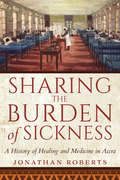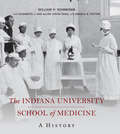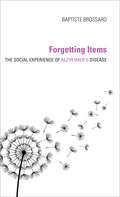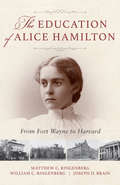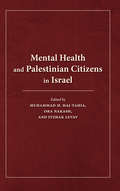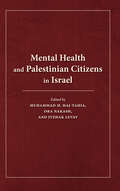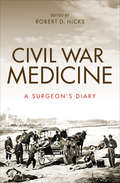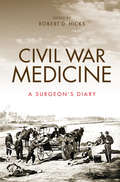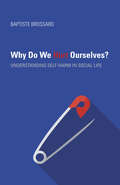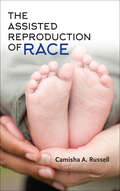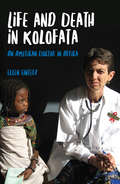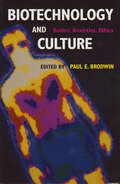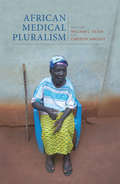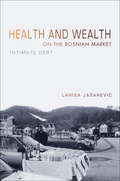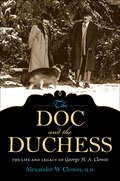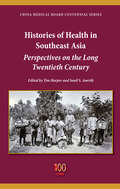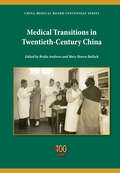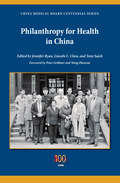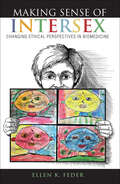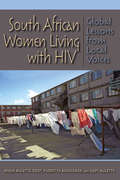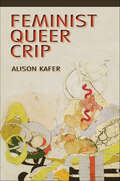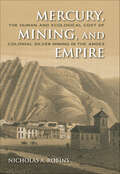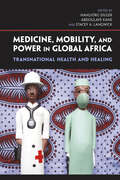- Table View
- List View
From AIDS to Population Health: How an American University and a Kenyan Medical School Transformed Healthcare in East Africa (Well House Bks.)
by James D. KellyFrom AIDS to Population Health explores the thirty-year history of a unique collaboration between the medical schools of Indiana University and Moi University in Kenya, as it progressed from combating the HIV/AIDS epidemic in East Africa to the building of a national plan to provide universal healthcare to all. The Academic Model Providing Access to Healthcare (AMPATH) program focuses on the medical education of healthcare professionals who are building communities that can take care of themselves.The overwhelming success of the AMPATH program and its continuing vibrant legacy today are showcased through dozens of striking photographs, telling interviews, and revealing anecdotes and encounters. It focuses on four of the most innovative projects among the fifty that AMPATH oversees: a microfinance officer who organizes villagers, an oncology nurse who runs outreach clinics, a farm extension agent working in partnership with a multinational agriculture corporation to improve farm output, and a special healthcare clinic exclusively for adolescents.Over its thirty-year history, AMPATH has served more than a million clients and trained 2,600 medical professionals and community health workers, always guided by its motto "Leading with Care." From AIDS to Population Health presents their compelling stories and explores the program's continuing legacy for the first time.
Sharing the Burden of Sickness: A History of Healing and Medicine in Accra
by Jonathan RobertsIn Sharing the Burden of Sickness, Jonathan Roberts examines the history of the healing cultures in Accra, Ghana. When people are sick in Accra, they can pursue a variety of therapeutic options. West African traditional healers, spiritual healers from the Islamic and Christian traditions, Western clinical medicine, and an open marketplace of over-the-counter medicine provide ample means to promote healing and preventing sickness. Each of these healing cultures had a historical point of arrival in the city of Accra, and Roberts tells the story of how they intertwined and how patients and healers worked together in their struggle against disease. By focusing on the medical history of one place, Roberts details how urban development, colonization, decolonization, and independence brought new populations to the city, where they shared their ideas about sickness and health. Sharing the Burden of Sickness explores medical history during important periods in Accra's history. Roberts not only introduces readers to a wide range of ideas about health but also charts a course for a thoroughly pluralistic culture of healing in the future, especially with the spread of new epidemics of HIV/AIDS and ebola.
The Indiana University School of Medicine: A History (Well House Books)
by William H. SchneiderThe Indiana University School of Medicine: A History tells the story of the school and its faculty and students in fascinating detail. Founded in the early 20th century, the Indiana University School of Medicine went on to become a leading medical facility, preparing students for careers in medicine and providing healthcare across Indiana. Historian William Schneider draws on a treasure trove of historical images and documents, to recount how the school began life as the Medical Department in 1903, and later became the Indiana University School of Medicine, which was established as a full four-year school after merging with two private schools in 1908. Thanks to state support and local philanthropy, it quickly added new hospitals, which by the 1920s made it the core of a medical center for the city of Indianapolis and the only medical school in the state.From modest beginnings, and the challenges of the Great Depression and the Second World War, the medical school has grown to meet the demands of every generation, becoming the leading resource for not only the education of physicians and for the conducting of medical research but also for the care and treatment of patients at the multi-hospital medical center. Today, the school boasts an annual income of over $1.5 billion, with over 2,000 full-time faculty teaching 1,350 MD students, and over $250 million in external research funding.
Forgetting Items: The Social Experience of Alzheimer's Disease
by Baptiste BrossardA book that’s “in the upper echelons of social dementia research . . . an entertaining and revelatory contribution to the field” (Symbolic Interaction).Alzheimer’s disease has not only profound medical consequences for the individual experiencing it but a life-changing impact on those around them. From the moment a person is suspected to be suffering from Alzheimer’s or another form of dementia, the interactions they encounter progressively change. Forgetting Items focuses on that social experience of Alzheimer’s, delineating the ways disease symptoms manifest and are understood through the interactions between patients and the people around them. Mapping out those interactions takes readers through the offices of geriatricians, into patients’ narratives and interviews with caregivers, down the corridors of nursing homes, and into the discourses shaping public policies and media coverage. Revealing the everyday experience of Alzheimer’s helps us better understand the depth of its impact and points us toward more knowledgeable, holistic ways to help treat the disease.“Considers the social aspect of dementia by considering how symptoms are expressed by the individual and understood/interpreted by those close to them. The author’s goal is to help us understand common experiences associated with dementia and ways to interpret those experiences through the lens of sociology.” —ISCHP (International Society of Critical Health Psychology)
Forgetting Items: The Social Experience of Alzheimer's Disease
by Baptiste BrossardA book that’s “in the upper echelons of social dementia research . . . an entertaining and revelatory contribution to the field” (Symbolic Interaction).Alzheimer’s disease has not only profound medical consequences for the individual experiencing it but a life-changing impact on those around them. From the moment a person is suspected to be suffering from Alzheimer’s or another form of dementia, the interactions they encounter progressively change. Forgetting Items focuses on that social experience of Alzheimer’s, delineating the ways disease symptoms manifest and are understood through the interactions between patients and the people around them. Mapping out those interactions takes readers through the offices of geriatricians, into patients’ narratives and interviews with caregivers, down the corridors of nursing homes, and into the discourses shaping public policies and media coverage. Revealing the everyday experience of Alzheimer’s helps us better understand the depth of its impact and points us toward more knowledgeable, holistic ways to help treat the disease.“Considers the social aspect of dementia by considering how symptoms are expressed by the individual and understood/interpreted by those close to them. The author’s goal is to help us understand common experiences associated with dementia and ways to interpret those experiences through the lens of sociology.” —ISCHP (International Society of Critical Health Psychology)
The Education of Alice Hamilton: From Fort Wayne to Harvard
by Matthew C. Ringenberg William C. Ringenberg Joseph D. BrainA biography of Harvard’s first female faculty member—a pioneer in public health and worker safety.Born and raised in Fort Wayne, Indiana, Alice Hamilton graduated from medical school in 1893, and after completing internships at hospitals in Minneapolis and Boston, she rejected private practice and began dedicating herself to public health. Focusing on the investigation of the health and safety measures—or rather lack thereof—in the nation’s factories and mines during the second decade of the twentieth century, her discoveries led to factory and mine level-initiated reforms, and to city, state, and federal reform legislation. It also led to a greater recognition in the nation’s universities for formal academic programs in industrial and public health. In 1919, Harvard officials considered Hamilton the best-qualified person in the country to lead their effort in this area. The Education of Alice Hamilton is an inspiring story of a woman who lived a remarkable life at a time when women were not always welcome in medical circles—serving as personal physician to Jane Addams, founder of Hull House; traveling to the Soviet Union and Nazi Germany; researching the effects of mercury, carbon monoxide, benzene, and other substances on workers. She was sometimes ignored—such as when she warned of the dangers of lead in gasoline decades before it was eventually banned—but she persisted, and thanks in part to her groundbreaking work, Americans now enjoy the protection of OSHA, the Occupational Safety and Health Act.
Mental Health and Palestinian Citizens in Israel (Indiana Series in Middle East Studies)
by Edited by Muhammad M. Haj-Yahia Ora Nakash Itzhak LevavMinorities face particular social strains, and these are often manifested in their overall mental health. In Israel, just under a quarter of the citizens are Arab Palestinians, yet very little has been published exploring the spectrum of mental health issues prevalent in this population. The work collected here draws on the first-hand experience of experts working with Israeli Palestinians to highlight the problems faced by service users, their families, and their communities. Palestinians in Israel face unique social, gender, and family-related conditions that also need reliable research and assessment. Mental Health and Palestinian Citizens in Israel offers research and observation on three central topics: socio-cultural determinants of mental health, mental health needs, and mental health service utilization. From suicidal behaviors and addiction to generational trauma and the particular concerns of children and the elderly, this broad and careful collection of research opens new dialogues on treatment, prevention, and methods for providing the best possible care to those in need.
Mental Health and Palestinian Citizens in Israel (Indiana Series In Middle East Studies)
by Edited by Muhammad M. Haj-Yahia, Ora Nakash, and Itzhak LevavSocial work studies examining the mental health issues faced by Arab-Palestinian service users, their families, and their communities in Israel.Minorities face particular social strains, and these are often manifested in their overall mental health. In Israel, just under a quarter of the citizens are Arab Palestinians, yet very little has been published exploring the spectrum of mental health issues prevalent in this population. The work collected here draws on the first-hand experience of experts working with Israeli Palestinians to highlight the problems faced by service users, their families, and their communities. Palestinians in Israel face unique social, gender, and family-related conditions that also need reliable research and assessment. Mental Health and Palestinian Citizens in Israel offers research and observation on three central topics: socio-cultural determinants of mental health, mental health needs, and mental health service utilization. From suicidal behaviors and addiction to generational trauma and the particular concerns of children and the elderly, this broad and careful collection of research opens new dialogues on treatment, prevention, and methods for providing the best possible care to those in need.
Civil War Medicine: A Surgeon's Diary
by Shauna Devine Guy R. Hasegawa James M. EdmonsonIn this never before published diary, 29-year-old surgeon James Fulton transports readers into the harsh and deadly conditions of the Civil War as he struggles to save the lives of the patients under his care. Fulton joined a Union army volunteer regiment in 1862, only a year into the Civil War, and immediately began chronicling his experiences in a pocket diary. Despite his capture by the Confederate Army at Gettysburg and the confiscation of his medical tools, Fulton was able to keep his diary with him at all times. He provides a detailed account of the next two years, including his experiences treating the wounded and diseased during some of the most critical campaigns of the Civil War and his relationships with soldiers, their commanders, civilians, other health-care workers, and the opposing Confederate army. The diary also includes his notes on recipes for medical ailments from sore throats to syphilis. In addition to Fulton's diary, editor Robert D. Hicks and experts in Civil War medicine provide context and additional information on the practice and development of medicine during the Civil War, including the technology and methods available at the time, the organization of military medicine, doctor-patient interactions, and the role of women as caregivers and relief workers. Civil War Medicine: A Surgeon's Diary provides a compelling new account of the lives of soldiers during the Civil War and a doctor's experience of one of the worst health crises ever faced by the United States.
Civil War Medicine: A Surgeon's Diary
by Robert D. HicksIn this never before published diary, 29-year-old surgeon James Fulton transports readers into the harsh and deadly conditions of the Civil War as he struggles to save the lives of the patients under his care. Fulton joined a Union army volunteer regiment in 1862, only a year into the Civil War, and immediately began chronicling his experiences in a pocket diary. Despite his capture by the Confederate Army at Gettysburg and the confiscation of his medical tools, Fulton was able to keep his diary with him at all times. He provides a detailed account of the next two years, including his experiences treating the wounded and diseased during some of the most critical campaigns of the Civil War and his relationships with soldiers, their commanders, civilians, other health-care workers, and the opposing Confederate army. The diary also includes his notes on recipes for medical ailments from sore throats to syphilis. In addition to Fulton's diary, editor Robert D. Hicks and experts in Civil War medicine provide context and additional information on the practice and development of medicine during the Civil War, including the technology and methods available at the time, the organization of military medicine, doctor-patient interactions, and the role of women as caregivers and relief workers. Civil War Medicine: A Surgeon's Diary provides a compelling new account of the lives of soldiers during the Civil War and a doctor's experience of one of the worst health crises ever faced by the United States.
Why Do We Hurt Ourselves?: Understanding Self-Harm in Social Life
by Baptiste BrossardA sociological analysis of self-injury, the causes of it, and the conditions surrounding those who commit it.Why does an estimated 5% of the general population intentionally and repeatedly hurt themselves? What are the reasons certain people resort to self-injury as a way to manage their daily lives? In Why Do We Hurt Ourselves, sociologist Baptiste Brossard draws on a five-year survey of self-injurers and suggests that the answers can be traced to social, more than personal, causes. Self-injury is not a matter of disturbed individuals resorting to hurting themselves in the face of individual weaknesses and difficulties. Rather, self-injury is the reaction of individuals to the tensions that compose, day after day, the tumultuousness of their social life and position. Self-harm is a practice that people use to self-control and maintain order—to calm down, or to avoid “going haywire” or “breaking everything.” More broadly, through this research Brossard works to develop a perspective on the contemporary social world at large, exploring quests for self-control in modern Western societies.
The Assisted Reproduction of Race
by Camisha A. RussellA philosopher examines the social implications of assisted reproductive technologies at the intersection of race, medicine, and bioethics.The use of assisted reproductive technologies (ART)—in vitro fertilization, artificial insemination, and gestational surrogacy—challenges contemporary notions of what it means to be parents or families. Camisha A. Russell argues that these technologies also bring new insight to ideas and questions surrounding race. She does this in part by reframing ART, as medical technologies that also act as technologies of kinship.Thinking about race in terms of technology brings together the common academic insight that race is a social construction with the equally important insight that race is a political tool used in different contexts for a variety of ends. As Russell explores ideas about race through their role in ART, she brings together social and political views to shift debates from what race is to what race does, how it is used, and what effects it has had in the world.
Life and Death in Kolofata: An American Doctor in Africa
by Ellen EinterzWhen Dr. Ellen Einterz first arrives in the town of Kolofata in Cameroon, the situation is dire: patients are exploited by healthcare workers, unsterilized needles are reused, and only the wealthy can afford care. In Life and Death in Kolofata: An American Doctor in Africa, Einterz tells her remarkable story of delivering healthcare for 24 years in one of the poorest countries in the world, revealing both touching stories of those she is able to help and the terrible suffering of people born in extreme poverty. In one case, a 6-year-old burn victim suffers after an oil tanker tips and catches fire; in another story, Dr. Einterz delivers a child in the front yard of her home. In addition to struggling to cure diseases and injuries and combat malnutrition, Einterz faced another kind of danger: the terrorist organization Boko Haram had successively kidnapped foreigners from Cameroon, and they had set their sights on the American in Kolofata. It would only be a matter of time before they would come for her. Tragic, heartwarming, and at times even humorous, Life and Death in Kolofata illustrates daily life for the people of Cameroon and their doctor, documenting both the incredible human suffering in the world and the difference that can be made by those willing to help.
Biotechnology and Culture: Bodies, Anxieties, Ethics
by Paul E. BrodwinBiotechnology and CultureBodies, Anxieties, EthicsEdited by Paul BrodwinUntangles the broad cultural effects of biotechnologies "A timely and perceptive look from many acute angles, at some of the most anxiety producing issues of the day." —Paul Rabinow, University of California, Berkeley"This impressive collection offers a number of rich examples of why the development of anthropological studies of science, technology, and their disruptive social effects is a leading edge of critical enquiry." —Arthur Kleinman, Harvard UniversityAs birth, illness, and death increasingly come under technological control, struggles arise over who should control the body and define its limits and capacities. Biotechnologies turn the traditional "facts of life" into matters of expert judgment and partisan debate. They blur the boundary separating people from machines, male from female, and nature from culture. In these diverse ways, they destroy the "gold standard" of the body, formerly taken for granted. Biotechnologies become a convenient, tangible focus for political contests over the nuclear family, legal and professional authority, and relations between the sexes. Medical interventions also transform intimate personal experience: giving birth, building new families, and surviving serious illness now immerse us in a web of machines, expert authority, and electronic images. We use and imagine the body in radically different ways, and from these emerge new collective discourses of morality and personal identity.Biotechnology and Culture: Bodies, Anxieties, Ethics brings together historians, anthropologists, cultural critics, and feminists to examine the broad cultural effects of technologies such as surrogacy, tissue-culture research, and medical imaging. The moral anxieties raised by biotechnologies and their circulation across class and national boundaries provide other interdisciplinary themes for discourse in these essays. The authors favor complex social dramas of the refusal, celebration, or ambivalent acceptance of new medical procedures. Eschewing polemics or pure theory, contributors show how biotechnology collides with everyday life and reshapes the political and personal meanings of the body.Contributors include Paul Brodwin, Lisa Cartwright, Thomas Csordas, Gillian Goslinga-Roy, Deborah Grayson, Donald Joralemon, Hannah Landecker, Thomas Laqueur, Robert Nelson, Susan Squier, Janelle Taylor, and Alice Wexler.Paul Brodwin, Associate Professor of Anthropology at the University of Wisconsin-Milwaukee and Adjunct Professor of Bioethics at the Medical College of Wisconsin, is the author of Medicine and Morality in Haiti: The Contest for Healing Power and a coeditor of Pain as Human Experience: Anthropological Perspectives.Theories of Contemporary Culture—Kathleen Woodward, general editor
African Medical Pluralism
by William C. Olsen Carolyn SargentIn most places on the African continent, multiple health care options exist and patients draw on a therapeutic continuum that ranges from traditional medicine and religious healing to the latest in biomedical technology. The ethnographically based essays in this volume highlight African ways of perceiving sickness, making sense of and treating suffering, and thinking about health care to reveal the range and practice of everyday medicine in Africa through historical, political, and economic contexts.
Health and Wealth on the Bosnian Market: Intimate Debt
by Larisa JasarevicLarisa Jasarevic offers an unforgettable look at the everyday experiences of people living in post-socialist, post-war Bosnia. Not at all existing on the world's margins, Bosnians today are concerned with the good life and are as entangled in consumer debt as everyone else. The insecurities of living in an economy dominated by informal networks of trade, personal credit, and indebtedness are experienced by Bosnians in terms of physical ailments, some not recognized by Western medical science. Jasarevic follows ordinary Bosnians in their search for treatment--from use of pharmaceuticals to alternative medicines and folk healers of various kinds. Financial well-being and health are woven together for Bosnians, and Jasarevic adeptly traces the links between the two realms. In the process, she addresses a number of themes that have been important in studies of life under neoliberalism in other parts of the world.
The Doc and the Duchess: The Life And Legacy Of George H. A. Clowes
by John Lechleiter Alexander W. ClowesGeorge Henry Alexander Clowes was a pivotal figure in the development of the insulin program at the Eli Lilly Company. Through his leadership, scientists and clinicians at Lilly and the University of Toronto created a unique, international team to develop and purify insulin and take the production of this life-saving agent to an industrial scale. This biography, written by his grandson, presents his scientific achievements, and also takes note of his social and philanthropic contributions, which he shared with his wife, Edith. It tells the story of Clowes from his childhood in late Victorian England to his death at Woods Hole on Cape Cod in 1958. Educated in England and Germany, Clowes came to America to join a startup laboratory in Buffalo, where he conducted basic research on cancer and applied research on other disease-related problems. Assuming the position of head of research at Lilly, Clowes was at the center of one of the great discoveries that changed the course of medical history and offered new life to millions of individuals with diabetes and other metabolic disorders. Clowes was also instrumental in the development of other commercial pharmaceutical advances. Devoted to a number of philanthropic causes, Clowes and Edith contributed greatly to the cultural life of his adopted country, a contribution that continues to this day.
Histories of Health in Southeast Asia: Perspectives on the Long Twentieth Century (China Medical Board Centennial Series)
by Tim Harper and Sunil S. AmrithHealth patterns in Southeast Asia have changed profoundly over the past century. In that period, epidemic and chronic diseases, environmental transformations, and international health institutions have created new connections within the region and the increased interdependence of Southeast Asia with China and India. In this volume leading scholars provide a new approach to the history of health in Southeast Asia. Framed by a series of synoptic pieces on the "Landscapes of Health" in Southeast Asia in 1914, 1950, and 2014 the essays interweave local, national, and regional perspectives. They range from studies of long-term processes such as changing epidemics, mortality and aging, and environmental history to detailed accounts of particular episodes: the global cholera epidemic and the hajj, the influenza epidemic of 1918, WWII, and natural disasters. The writers also examine state policy on healthcare and the influence of organizations, from NGOs such as the China Medical Board and the Rockefeller Foundation to grassroots organizations in Thailand, Indonesia, and the Philippines.
Medical Transitions in Twentieth-Century China (China Medical Board Centennial Series)
by Bridie Andrews Mary Brown BullockThis volume examines important aspects of China's century-long search to provide appropriate and effective health care for its people. Four subjects--disease and healing, encounters and accommodations, institutions and professions, and people's health--organize discussions across case studies of schistosomiasis, tuberculosis, mental health, and tobacco and health. Among the book's significant conclusions are the importance of barefoot doctors in disseminating western medicine, the improvements in medical health and services during the long Sino-Japanese war, and the important role of the Chinese consumer. Intended for an audience of health practitioners, historians, and others interested in the history of medicine and health in China, the book is one of three commissioned by the China Medical Board to mark its centennial in 2014.
Philanthropy for Health in China
by Jennifer Ryan Anthony J. Saich Lincoln C. ChenDrawing on the expertise of Chinese and Western academics and practitioners, the contributors to this volume aim to advance the understanding of philanthropy for health in China in the 20th century and to identify future challenges and opportunities. Considering government, NGO leaders, domestic philanthropists, and foreign foundations, the volume examines the historical roots and distinct stages of philanthropy and charity in China, the health challenges philanthropy must address, and the role of the Chinese government, including its support for Government Organized Non-Governmental Organizations (GONGOs). The editors discuss strategies and practices of international philanthropy for health; the role of philanthropy in China's evolving health system; and the prospects for philanthropy in a country beginning to engage with civil society.
Making Sense of Intersex: Changing Ethical Perspectives In Biomedicine
by Ellen K. FederPutting the ethical tools of philosophy to work, Ellen K. Feder seeks to clarify how we should understand "the problem" of intersex. Adults often report that medical interventions they underwent as children to "correct" atypical sex anatomies caused them physical and psychological harm. Proposing a philosophical framework for the treatment of children with intersex conditions--one that acknowledges the intertwined identities of parents, children, and their doctors--Feder presents a persuasive moral argument for collective responsibility to these children and their families.
South African Women Living with HIV
by Judy Aulette Floretta Boonzaier Anna Aulette-RootBased on interviews with women who are HIV positive, this sobering pandemic brings to light the deeply rooted and complex problems of living with HIV. Already pushed to the edges of society by poverty, racial politics, and gender injustice, women with HIV in South Africa have found ways to cope with work and men, disclosure of their HIV status, and care for families and children to create a sense of normalcy in their lives. As women take control of their treatment, they help to determine effective routes to ending the spread of the disease.
Feminist, Queer, Crip
by Alison KaferIn Feminist, Queer, Crip Alison Kafer imagines a different future for disability and disabled bodies. Challenging the ways in which ideas about the future and time have been deployed in the service of compulsory able-bodiedness and able-mindedness, Kafer rejects the idea of disability as a pre-determined limit. She juxtaposes theories, movements, and identities such as environmental justice, reproductive justice, cyborg theory, transgender politics, and disability that are typically discussed in isolation and envisions new possibilities for crip futures and feminist/queer/crip alliances. This bold book goes against the grain of normalization and promotes a political framework for a more just world.
Mercury, Mining, and Empire: The Human and Ecological Cost of Colonial Silver Mining in the Andes
by Nicholas A. RobinsOn the basis of an examination of the colonial mercury and silver production processes and related labor systems, Mercury, Mining, and Empire explores the effects of mercury pollution in colonial Huancavelica, Peru, and Potosí, in present-day Bolivia. The book presents a multifaceted and interwoven tale of what colonial exploitation of indigenous peoples and resources left in its wake. It is a socio-ecological history that explores the toxic interrelationships between mercury and silver production, urban environments, and the people who lived and worked in them. Nicholas A. Robins tells the story of how native peoples in the region were conscripted into the noxious ranks of foot soldiers of proto-globalism, and how their fate, and that of their communities, was—and still is—chained to it.
Medicine, Mobility, and Power in Global Africa: Transnational Health And Healing
by Hansjörg DilgerRecent political, social, and economic changes in Africa have provoked radical shifts in the landscape of health and healthcare. Medicine, Mobility, and Power in Global Africa captures the multiple dynamics of a globalized world and its impact on medicine, health, and the delivery of healthcare in Africa--and beyond. Essays by an international group of contributors take on intractable problems such as HIV/AIDS, malaria, and insufficient access to healthcare, drugs, resources, hospitals, and technologies. The movements of people and resources described here expose the growing challenges of poverty and public health, but they also show how new opportunities have been created for transforming healthcare and promoting care and healing.

